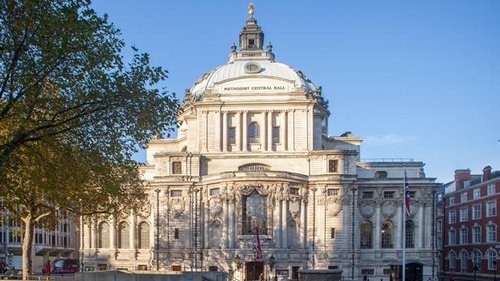The Forward Movement
The Forward Movement began in the 1880s, partly in response to Andrew Mearns' The Bitter Cry of Outcast London (1883), which focused attention on the desperate plight of the urban poor in the late Victorian age. Under the leadership of men like Henry J. Pope in Manchester and Hugh Price Hughes in the West London Mission, a determined effort was made to bridge the widening gap between Wesleyan Methodists and the working classes.

One feature was the building of 'Central Halls' between 1886 and 1934. These were secular in their architecture and furnishings and in the activities they provided as an alternative attraction to the music hall and public house. Much effective social work was done before the advent of the Welfare State, but the impact began to wane as their novelty wore off in the twentieth century; and they were palliative rather than remedial in their treatment of political and social evils.
The term 'Forward Movement' was also used among the Bible Christians, though in a more restricted way, the work being focused on Sunderland, Gravesend, Barry, Ilfracombe, Blackburn and Birmingham. There is some evidence of the term being used also among the Primitive Methodists, notably in connection with the work of James Flanagan. From 1889 Lady Lane UMFC chapel in Leeds became a Central Mission rather than an ordinary circuit chapel.
"During our three years at Brixton [1884-1887] a great deal of interest was aroused by a pamphlet, The Bitter Cry of Outcast London by Andrew Mearns, and the Methodist Church began to consider whether it was doing its duty in view of the appalling conditions revealed... I believe that the term 'The Forward Movement' originated at one of those gatherings [at the manse and on Sunday evenings at Raleigh Hall], when Mrs. Alexander McArthur said in reply to some remark, 'We all belong to the forward movement here,' and that name caught on and stuck. Already there were plans being formed for a Mission to be opened in the East End, and my husband was looked upon by some of the ardent spirits as the most suitable man to be chosen as missioner. However, the elderly authorities in the Church were too cautious to approve of such an appointment. They feared my husband's ardent sympathies with the 'Left', and lived in constant apprehension of what he would do next. The East End Mission, however, started and the Rev. Peter Thompson did a noble work there for many years."
Katherine Price Hughes, The Story of my Life(1945) p.64
Authored by D. Colin Dews and John A. Vickers for DMBI: A Dictionary of Methodism in Britain and Ireland